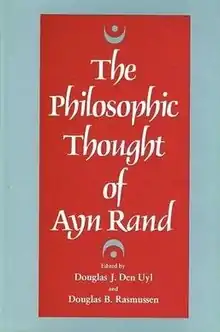The Philosophic Thought of Ayn Rand
The Philosophic Thought of Ayn Rand is a 1984 collection of essays on Ayn Rand's philosophy of Objectivism, edited by Douglas Den Uyl and Douglas B. Rasmussen.[1] It includes essays by nine different authors covering Rand's views in various areas of philosophy. The work received positive reviews, crediting it with bringing serious attention by philosophers to Rand and her work. However, reviewers also noted that the work assumed considerable prior knowledge of philosophy on the part of the reader.
 Cover of the first edition | |
| Editors | |
|---|---|
| Country | United States |
| Language | English |
| Subjects | |
| Publisher | University of Illinois Press |
Publication date | 1984 |
| Media type | Print (hardcover · paperback) |
| Pages | 284 |
| ISBN | 978-0-252-01407-9 |
Contents
The book is divided into three sections that represent different areas of philosophy addressed in Rand's thought. Each section starts with an essay by Den Uyl and Rasmussen, followed by essays from other contributors. The first section covers metaphysics and epistemology. It includes essays by Wallace Matson and Robert Hollinger. The second section covers ethics and contains essays by Jack Wheeler, Charles King, and Erick Mack. The final section covers political philosophy and has essays by Antony Flew and Tibor R. Machan.
Publication history
Den Uyl and Rassmussen began work on the book while Rand was still alive. When she heard about the project, she actively discouraged it, as she had done previously with other projects. Rand died in 1982, and work on the book proceeded despite her disapproval.[2]
The Philosophic Thought of Ayn Rand was first published by as a hardcover book by the University of Illinois Press in 1984. They released it as a paperback in 1986.[3]
Reception
Sidney Gendin gave The Philosophic Thought of Ayn Rand a positive review in Library Journal, writing that the work redressed the neglect of Rand's work by academic philosophers, avoided being uncritical of Rand, and revealed interesting parallels between Rand and writers such as Gilbert Ryle and J. L. Austin. However, he noted that the book assumed that the reader had "considerable background in general philosophy".[4] A review in The Freeman praised the book as "a valuable beginning by serious philosophers at the important task of evaluating, describing, and developing Rand's philosophy, in a dispassionate, objective manner."[5]
In Reason, the philosopher Randall Dipert wrote that the book "marks a turning point" in getting professional philosophers engaged with Rand's ideas, but was not "uniformly successful".[6] Rand scholar Mimi Reisel Gladstein described it as "a major contribution to Rand scholarship", although not always approachable for readers not versed in academic philosophy.[7] In 2003, Chris Matthew Sciabarra identified The Philosophic Thought of Ayn Rand as one of several books that reflected a growing interest in Rand after her death.[8]
References
- The Philosophic Thought of Ayn Rand at the Library of Congress
- McLemee, Scott (September 1999). "The Heirs Of Ayn Rand: Has Objectivism Gone Subjective?". Lingua Franca. 9 (6): 45–55.
- Formats and Editions of The Philosophic Thought of Ayn Rand. WorldCat. OCLC 9392804.
- Gendin, Sidney (January 1984). "The Philosophic Thought of Ayn Rand (Book)". Library Journal. 109 (1): 96. – via EBSCO's Academic Search Complete (subscription required)
- Baetjer, Jr., Howard (November 1984). "Book Reviews: The Philosophic Thought of Ayn Rand". The Freeman. 43 (11): 703.
- Dipert, Randall (January 1985). "Taking Ayn Rand Seriously". Reason. 16 (8): 58–62.
- Gladstein, Mimi Reisel (1999). The New Ayn Rand Companion. Westport, Connecticut: Greenwood Press. pp. 101–102. ISBN 0-313-30321-5. OCLC 40359365.
- Sciabarra, Chris Matthew (January 2003). "Recent Work". Philosophical Books. 44 (1): 42. doi:10.1111/1468-0149.00280. – via EBSCO's Academic Search Complete (subscription required)
External links
- "The Randian Argument Reconsidered: A Reply to Charles King", a paper by Paul St. F. Blair responding to King's essay in this volume